Plastic straws are small objects with a strange superpower: they end up everywhere.
They are the mosquitoes of the packaging world — tiny, incredibly annoying, and almost impossible to eradicate once they spread. That matters, because plastic does not disappear.
A plastic straw can linger for up to 200 years. One human life ≈ 80 years. A plastic straw ≈ three generations of guilt.
EU Single-Use Plastics Directive: What Distributors Need to Know
The EU finally said: enough.
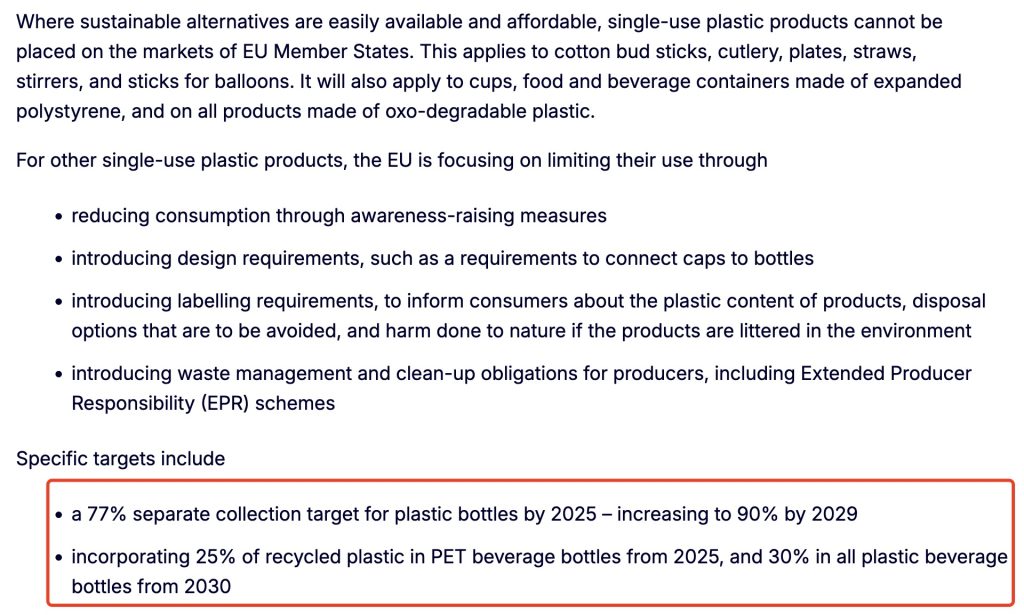
Source: Directive (EU) 2019/904 — EU Single-Use Plastics Directive
Publication: 5 June 2019
Objective: reduce the environmental impact of single-use plastic products
Key items restricted: plastic cutlery, plates, stirrers, straws, balloon sticks, EPS cups and food containers
Under the EU Single-Use Plastics Directive (Directive (EU) 2019/904), items like plastic straws are now formally being phased out. The Directive is not warm inspirational poetry — it is basically the legislative equivalent of Nordic directness:
we know what is harmful → so we stop.
Sweden fits this mindset perfectly.
No drama, no long manifestos, no greenwashing speeches.
Just: let’s fix this.
Which brings us to bamboo fiber.
The bamboo fiber confusion — and why we need to talk about it
There is a sentence we are tired of hearing in global trade fairs:
“Oh, bamboo? like those fragile bamboo powder bowls?”
No.
No.
Absolutely no.
Bamboo powder ≠ bamboo fiber
(using flour ≠ eating bread — same level of difference)
- bamboo powder is a filler
- bamboo fiber is a structural material
And here is the part nobody likes to say out loud:
Most “bamboo powder” tableware on the market is basically polypropylene with bamboo powder sprinkled in for storytelling purposes.
In EU regulatory language — that category = plastic with natural additives.
Not a natural fiber material.
This is why the EU has recalled and fined so many of those products in the last 5 years.
The eco-story was nicer than the actual material reality.
One performs like mashed paper.
One performs like engineered cellulose with real mechanical integrity.
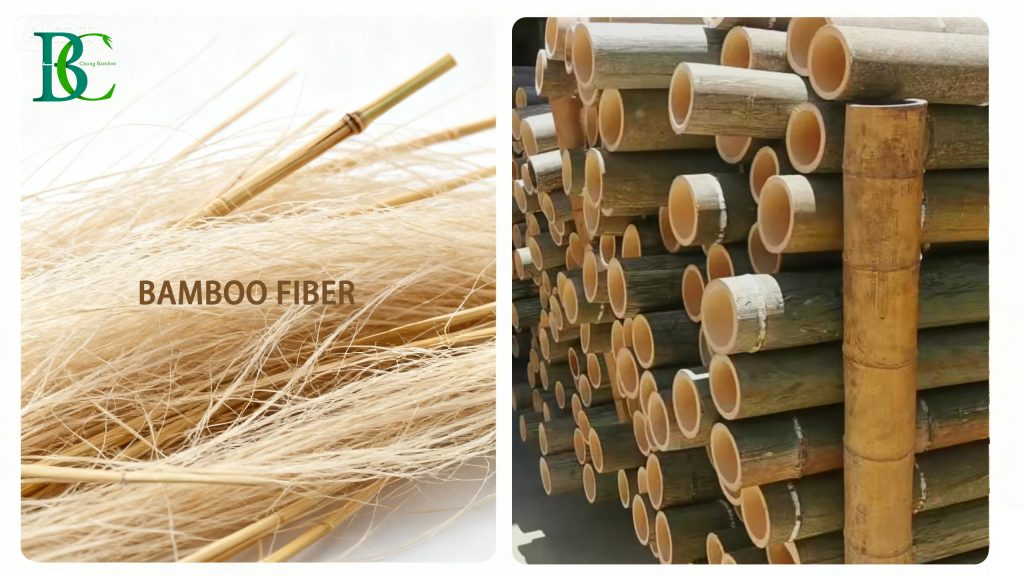
Bamboo powder bowls are the reason many people assume “bamboo tableware is a scam”.
They collapse in coffee, and consumers feel betrayed.
We need to be blunt, but with Nordic dryness:
if bamboo powder was a good idea, it would not fold in a latte.
Bamboo fiber is different — it behaves closer to cellulose composite technology.
Not hype. Not philosophy. Not green marketing varnish.
Material science.
Separating lignocellulosic fiber → refining → pressing → forming.
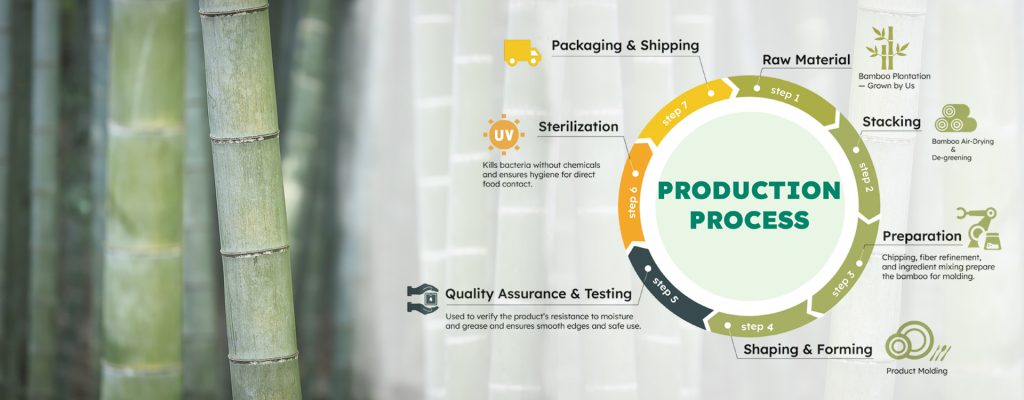
It is the difference between oat husk and oat milk.
Same plant universe, different engineering universe.
And Sweden understands material integrity — IKEA built an empire on it.
Why bamboo fiber actually works
This is important for procurement managers, packaging buyers, and chain restaurant category leaders:
Bamboo fiber is not simply “eco” — it performs on the physical level.
the 4 behaviours that matter in real food service
| Behaviour | bamboo fiber does |
|---|---|
| water exposure | stays firm, no collapsing |
| heat exposure | tolerates hot liquids like coffee |
| fat exposure | keeps rigidity with oils & dressings |
| sensory | smooth against lips, no “paper fuzz”, no “metal bite” |
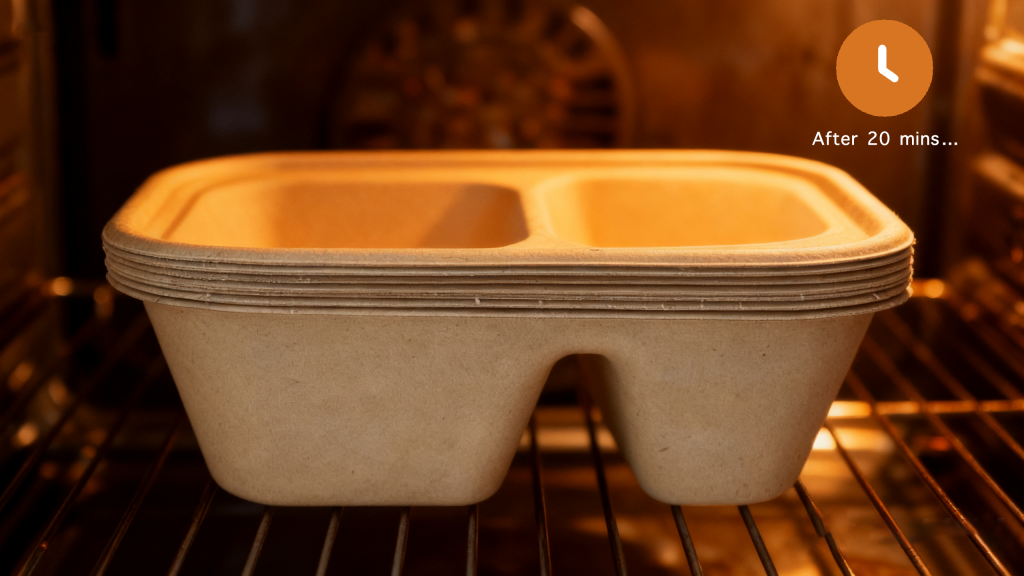
Straws are the easiest example:
a bamboo fiber straw can sit in iced Fanta 40+ minutes — still intact.
Paper straw = 9-15 minutes before structural fatigue.
Sugarcane straw = cheaper, yes, but lower thermal stability.
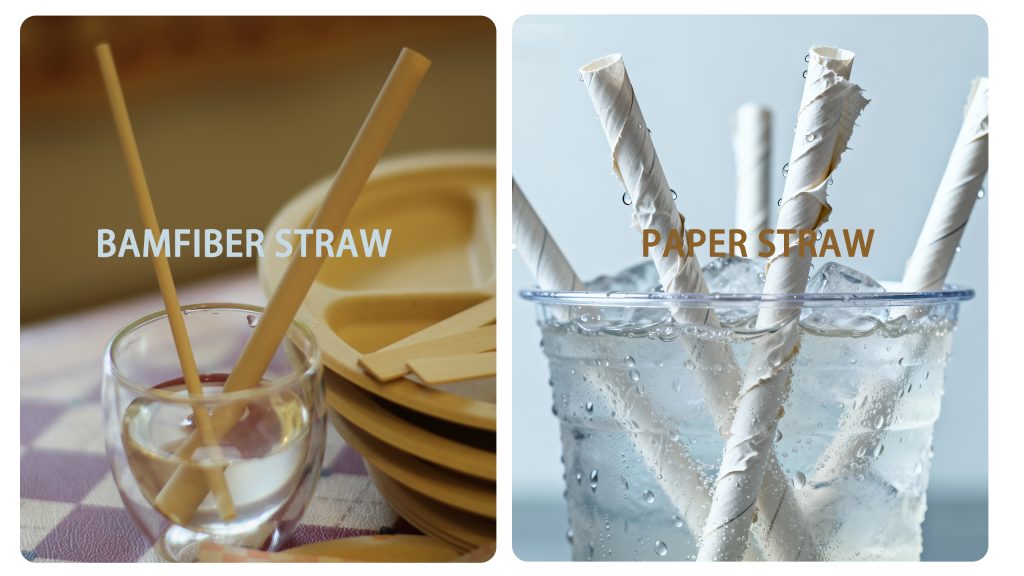
This is why we say:
sustainable is only meaningful when it works in practice, not only on PowerPoint.
And Sweden has never been a country satisfied by “symbolic sustainability”.
Function matters.
Quality matters.
Even humour matters — but usually dry humour like this sentence.
Bamboo fiber in real food service — beyond just straws
When we say bamboo fiber tableware, we mean a complete system — not a single product.
Think of it as a modular sustainability platform for restaurants, cafés, and food delivery chains.
Real food service happens in motion — soup spilled, salad tossed, coffee brewed, burger boxed.
Our material philosophy starts there: if it doesn’t hold up in daily use, it doesn’t deserve the word eco.
The bamboo fiber range covers:
| Category | Typical Use | Why It Matters |
|---|---|---|
| Soup & salad bowls | dine-in, takeaway | resist temperature swings; no softening with liquids |
| Coffee & drink cups | hot & cold | stable up to 260°C; smooth mouthfeel; recyclable cellulose base |
| Condiment boxes | sauces, dressings | oil-proof & stackable; no leakage, no chemical smell |
| Burger & meal boxes | takeaway, delivery | rigid under weight; lids lock tight without plastic hinge |
| Straws | cold & hot drinks | 40–60 min in iced beverages without collapse; compostable |
| Cutlery & trays | fast casual dining | form-retaining |
| Lids & accessories | sealing, branding | customizable embossing, or texture finish |
Each product starts from refined bamboo cellulose, pressed and molded under controlled temperature and pressure — no melamine, no resin filler, no greenwashing vocabulary.
The goal is not to mimic plastic;
the goal is to outperform it on integrity.
How Sweden’s Restaurants Can Transition to Sustainable Tableware
Customization = brand storytelling
A restaurant’s tableware is not decoration — it’s a silent brand ambassador.
The surface, texture, and form tell your customers what kind of care lives behind the food.
That’s why we design custom bamboo fiber solutions around four restaurant archetypes:
- Nordic casual – clean matte finish, tone-on-tone color palette
- Asian fusion – warmer undertone, bamboo texture retained subtly
- Fast service – structural rigidity first, stackability optimized
- Café culture – tactile comfort + cup-lid fit perfection
Your brand might not need a speech about sustainability.
It just needs materials that make consistency visible.
Customization options include:
- Embossed or printed branding (eco inks, low-temp press)
- Material tone (natural beige)
- Form factor adaptation (diameter, wall thickness, lid interface)
- Functional tuning (liquid hold time, rigidity under heat, etc.)
We believe “custom” should mean engineered for purpose, not painted for marketing.
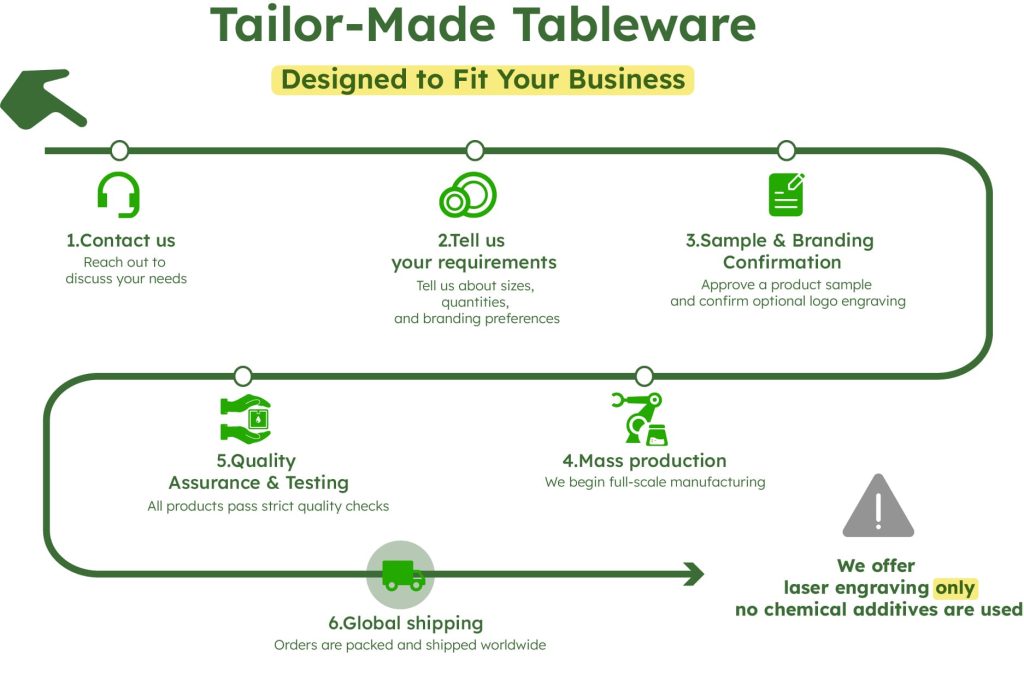
Why Sweden & Why now
Sweden already leads in the logic of sustainable design:
less noise, more substance.
But even here, the hospitality industry faces a quiet problem:
the gap between sustainability theory and operational reality.
Paper cups collapse. PLA lids warp. “Biodegradable” labels often hide petrochemical traces.
Procurement teams are tired of beautiful words and short-lived products.
This is exactly where bamboo fiber fits the Nordic temperament —
practical innovation, material honesty, and respect for longevity.
Nordic pragmatism meets Asian material science.
Why Sweden makes sense for bamboo fiber distribution:
- 🇸🇪 Policy alignment — EU Single-Use Plastics Directive enforcement fully active since 2024; municipalities tightening procurement criteria.
- ♻️ Consumer maturity — Swedish consumers expect brands to verify eco claims, not just repeat slogans.
- 🧠 Design literacy — material stories are understood and appreciated; sustainability is part of brand identity.
- 📈 Market gap — growing demand in café & food delivery segments for reliable “non-plastic” solutions that perform like real materials.
We are now opening collaboration opportunities for Swedish distributors and food-service solution providers who share this principle:
“Sustainability is not decoration — it’s design discipline.”
Our partners will receive:
- direct access to our certified product line and technical documentation
- EU-compliant test data (migration, compostability, and food-contact safety)
- marketing assets for co-branding in EN / SV
- sample kits and logistics support within the EU zone
If you represent a procurement channel, F&B brand, or regional distributor in Sweden,
this is an invitation to join the transition from symbolic sustainability → functional sustainability.
Closing — integrity is the new luxury
Plastic was convenient.
Paper was temporary.
Bamboo fiber is deliberate.
It doesn’t shout.
It performs.
That’s the kind of sustainability Sweden deserves — quiet, exact, and built to last through lunch rushes and coffee breaks alike.
See the full product range & EU certification proof here → https://www.chongbamboo.com/products/
Because in the end, integrity is the most sustainable material of all.
